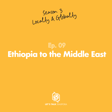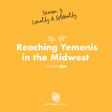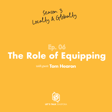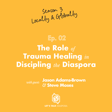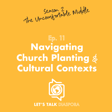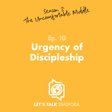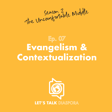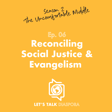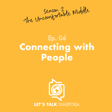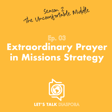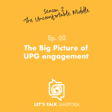Introduction to Season Three and Guests
00:00:06
Speaker
to season three of Let's Talk Diaspora. We're titling this season local. It's because it's at the heart of what Let's Talk Diaspora is, is we're mobilizing and drawing attention to the global diaspora and the strategic need and opportunity of the ends of the earth being reached through the diaspora. So it's both a global and local perspective. So that's the thread that goes through all of our conversations.
00:00:35
Speaker
in season three. Most of our conversations around this topic are with guests. And so we have just some amazing guests who join us in season three. We have people who are serving in the ends of the earth who actually learned how to be a missionary in the diaspora. We have people who served a decade overseas, now stewarding strategy among the diaspora. We're going to hear about people reaching some of the hardest to reach, least reach people groups,
00:01:03
Speaker
in a midwest city and then we're going to look at different roles that support plays in the task of discipling the nations through the diaspora such as looking at the role of trauma healing and discipling the diaspora
00:01:18
Speaker
Most of those people in the diaspora, they're dealing with trauma and loss. We're going to hear about the role of media and social media outreach. We're going to look at the role of equipping the important aspect of making sure people are equipped well to cross cultures. We're also going to look at the role of language acquisition or language learning. So hold on.
Guests' Background and Mission Journey
00:01:41
Speaker
We're jumping in to season three. Let's talk diaspora.
00:01:47
Speaker
Well, I want to say welcome back to Let's Talk Diaspora. I'm really excited about this season. We're in season two and talking about locally and globally in the diaspora. I'm extremely excited because we have a couple of guests that are dear to my heart. I'm with us today and we've served together overseas in South Asia.
00:02:13
Speaker
And I've really, they're heroes to me as I've watched them live, just doing what they do, being led by the spirit and just going out and sharing the Christ and discipling others to know Him and be stronger in their faith. So I know they've seen many things and many stories. So we look forward to hearing from you all. Why don't you give us a little introduction of who you are and yeah, we'll go from there.
00:02:45
Speaker
Yeah, it's great to be with you, Rebecca and Bud. I'm Will. And I'm Carol. And we are currently in Atlanta, Georgia. But we, like you said, we served together in South Asia for a number of years and really enjoyed those memories. It's so great to be on with you right now. Yeah, we served there for three years in one country in South Asia. I'll just keep it kind of generic. And then a full 10 years in another country. And we're back here in the United States.
00:03:14
Speaker
and still on mission. Yeah, Will and Carol, it's so great to have you. I've not known you as long as Rebecca, but Will and Carol, we've known each other for probably three or four years. I remember meeting, I think in Tennessee somewhere at a mutual friend's house, and we've just had the pleasure of working together and laboring together.
00:03:35
Speaker
in a different season of your life. So that's one of the things we want to talk about in this episode is you have that experience overseas.
Challenges and Strategies in South Asia
00:03:43
Speaker
Now you're back in Atlanta, Georgia. You're working among the diaspora, really running strategy and really a servant leader role, helping many of us pursue the ends of the earth, but in inner cities.
00:03:59
Speaker
And so it's just so grateful to have you here with us. And I'm going to be more quiet this episode because I just want to hear this story and learn from it. But along the way, we're going to pick up so many nuggets. So grateful to have you.
00:04:15
Speaker
So Will and Carol, tell us the story of you going, maybe what led you to South Asia. You said two different countries, a total of over a decade. Just pull the curtain back of what God was doing in your life, how he got you there, and what did you see God do in South Asia?
00:04:36
Speaker
Right. Well, I'll tell you what, missions wasn't our first choice for how to spend our life. I'll start there. We were actually having a good time in terms of the career choices we'd made. Things were looking good, but as we continued to grow in our relationship with the Lord and our awareness of his heart for the nations, we were shocked to hear that there were places in the world that had
00:05:01
Speaker
very little access to the gospel and very few people going to create that access and As we considered, you know in our part-time, you know, you know outside of work You know sharing the gospel with our friends and family and neighbors here We thought well, why wouldn't we be the ones to go? to the least reach in the furthest places on the planet to the uttermost parts of the world and so and
00:05:24
Speaker
That created an abrupt stop in our lives where back then we were told by our pastors and different people that we needed to go to Bible college and seminary. And so we did that. I ended up getting a Bible degree. We already had two kids at the time. And by the time we graduated from seminary, we had four kids.
00:05:46
Speaker
And then finally, we're ready, according to our organization, to go to the mission field for the first time. And so we went to South Asia
Leadership Development and Cultural Adaptation
00:05:54
Speaker
with lots of education, for sure. But we got there and we were in for quite an awakening, a rude awakening on what it's like to live in such a different, extreme culture. And
00:06:10
Speaker
That's really where a lot of the education began for us, the real practical education and really coming to the end of ourselves. I mean, we realized for everything that we knew, there was a lot that we had yet to learn for sure. And that's going to be true for most people. But what I am excited about, not to get ahead of ourselves with diaspora, is the opportunity to get ahead of that learning curve here in North America.
00:06:40
Speaker
And but to go back to our story, you know, we served in two different countries. We really served across South Asia, the Himalayan belt, in fact. And in our time there, our vision was always to reach the least reached and to see churches and disciples multiplying.
00:06:59
Speaker
But our biggest breakthrough there was really coming to the realization that it was leadership development and leaving behind people of the same culture to do the work that we intended to do. We just realized we do not need to be doing everything firsthand ourselves in terms of sharing the gospel and making disciples of the new believers. But if we could equip people to be missionaries that are near culture,
00:07:29
Speaker
That could definitely outlast our presence That was going to get us to our no place left vision which was to leave behind Apostolic recall people in South Asia and that's eventually where we got to in South Asia That's a great one Just quick follow-up question used a phrase that maybe not all of our listeners are familiar with and I know it's a phrase It's dear to your heart. Tell us more about this. No place left vision. I
00:07:57
Speaker
Well, you know, the phrase, no place left kind of emerged out of a lot of Bible study that happened while I was in South Asia with a number of my peers and coworkers. And as we studied the life of Paul and all of his missionary journeys, and even before that, you know, the example of Jesus and the way he, in the way he modeled, you know, a missionary lifestyle for, for Paul, you know, you look at,
00:08:26
Speaker
Romans 15 and you know Paul's reflecting on his previous work and he makes the comment that there's no longer any place for him in that area or in those regions as he's thinking
Women's Roles and Cultural Barriers
00:08:39
Speaker
about moving on to Spain. And so that really got us to think you know is should we be working toward perhaps that same kind of realization you know what did he have to see to feel comfortable
00:08:53
Speaker
to leave the work in the capable hands of those that he had developed as he continues to break new ground and build new foundations in places where there were no people like him. And so that by no means made us feel rushed, and that by no means made us feel like we had to make anything happen at all, but it did make us more observant, and it made us more intentional to do leadership development early on,
00:09:22
Speaker
and to really bring people to shoulder height as quickly as possible in terms of their capability and responsibility for reaching their own people there. So how did you come to a place where you knew that it was time that you were comfortable enough to leaving those that you had fed into and come back to North America?
00:09:48
Speaker
Well, that's a great question. Initially, and it's kind of funny the transition that took place. Initially, it was a real focus on numbers, frankly. It was, you know, how many churches, how many generations were they multiplying into? Definitely assessing elements of health. You know, number of new believers, those kind of metrics.
00:10:12
Speaker
And in time, I feel like I came to realize that it was that that was a great indicator for evaluating if we were doing the right things, if we were training the right things. But eventually, it was the character and the calling and the commitment of the national believers there, their commitment to continue the work, regardless of how many churches that I was able to see or understand.
00:10:40
Speaker
And so that changed a lot for me. It shifted more from the number of churches, the number of generations, the number of streams to the number of people that were called just like I was, yet perhaps to a cross-cultural calling within their own geographic area, their own country. And in a place like South Asia, it is a huge melting pot of you don't have to go far for people to do cross-cultural work there.
00:11:08
Speaker
But honestly, we would call it local ownership of the core missionary task. You know, we would train people on what the complete missionary task is, not just evangelism, not just discipleship, but moving all the way to church formation and leadership development. And when people were able to understand that's the pathway and they had simple tools for beginning that process with a long term development in mind,
00:11:34
Speaker
We knew that they had they understood the stewardships they needed to be attentive to to see the war continue after we leave.
00:11:47
Speaker
Another really interesting thing I love about your story that I think it would be great for others to hear is, Will, I know this has not been something that you've been doing alone. I know that Carol's been very involved and not just involved in taking care of those four children that were at home with you, but also out sharing with women and discipling them and developing leaders there as well. Carol, can you tell us a little bit about your story in this whole process?
00:12:20
Speaker
Yeah, well, I think when we first arrived in South Asia, and I was a little shell-shocked maybe, we were in a densely populated Muslim country. Just being out in the culture with my kids was exciting, was exhilarating, but I just didn't feel like I had a grasp on how to connect. I mean, what was it going to take?
00:12:51
Speaker
to really meet people and share the hope that I had. Had very few tools. I didn't have a clue. So it just started a process of really watching my husband and what he did. And I felt as a young mom and all these kids, I was homeschooling. I was just trying to just keep the family together. I was like, how can I really be invested
00:13:20
Speaker
my neighbors and the women that I'm meeting. And I really did focus on just meeting women, meeting the women that lived in my apartment building or in my community and just trying to get to know them, trying to understand their worldview. And then I would watch the trainings and we had the blessing of working among some traditional churches.
00:13:48
Speaker
So I could meet national believers and then our goal was to try to train them. And so when I would meet with women and then use these simple tools of discipleship and church planning training, a lot of times I felt like this is going right over their head. I don't know that they're grasping it. And then I'd start to talk to them and start to see, wow, they're dealing with some big issues.
00:14:17
Speaker
And so even though they're calling themselves believers and they're trying to learn how to make disciples themselves, they really don't understand the gospel. They really don't understand just the foundations of their faith. And so I kind of had to take a step back in, yeah, we want to teach you to share the gospel because you're the local, you're the one that can communicate it best. But if they don't fully understand it,
00:14:48
Speaker
I didn't want to teach them to go share a false gospel or an incorrect, incomplete gospel. So that just took me on a journey of finding a way to really connect with the women, understand what was going on in their lives. And in South Asia, it's complicated. Women are very devalued. In every country that we worked in, it was a little bit different, but just a general devaluing, a lack of understanding of their worth, a lack of
00:15:18
Speaker
just feeling like they're capable. They may be uneducated. They were definitely very smart, but if they're non-literate, it took a little more time than just going, hey, let me give you this gospel conversation training so you can share the gospel. You had to start figuring out where people were at. So we started asking questions and finding
00:15:44
Speaker
man, they may be dealing with abuse at home. They may be dealing with extreme poverty or illness or, I mean, just any number of really stressful situations. And so starting to do basic trainings, healthcare trainings, we worked with menstrual health, you know, because a lot of people, they had such taboos, you know, women were excluded from the home.
00:16:13
Speaker
when they were on their menstrual cycle. And so they just had all these concerns about, oh, well, I'm unclean. I can't do anything. I can't. So just basic training in that kind of personal health, um, training in how to relate to your family and to your husband. That was a foundation around
00:16:37
Speaker
this is how you share the gospel or in a basic understanding of what the gospel is. You know, there is a one true God who loves you incredibly, but you've been separated from him. And so just to be sure that they understood the gospel before we trained them to share the gospel. And then when they would share their testimonies, often we'd hear all they're saying about their testimony is they've had this miraculous healing. And so their entire theology was,
00:17:07
Speaker
if you believe God, he will heal you. And that's all they understood. And I was like, I can't teach them to share that testimony. They have to, they have to understand the more fullness of the gospel.
Training Methods and Identity in Mission Work
00:17:20
Speaker
So it just, in that sense, I felt like I needed to slow down. You know, we had these traditional, these trainings, these great four fields, trainings and, and gospel conversations and different tools, but,
00:17:35
Speaker
the blessing of being there and learning the language and being able to communicate to the people, the women that were there, the trainings just became more comprehensive. That's the best way to say. I would just say, my goodness, if you're not taking your life into the work, if it's not a partnership, men, you are missing out. Women are able to pick up on things and see things that we're just blind to sometimes.
00:18:05
Speaker
And Carol was very supportive and very encouraging, but when it was like, what do you see? And she's like, well, I'm afraid you're just missing, you're not connecting with the women in the room. And when she began to really look into it more deeply, we began to learn about the cultural realities that we're dealing with. And we learned that when these women go through their menstrual cycle, they would be put out of the home.
00:18:29
Speaker
And it's not uncommon for people in that country to die from the elements, to be outside in like a cow pen or something. It was just shocking. And then also their understanding about their own identity. They really did not believe, and you taught me this, that they were capable of understanding anything divine, anything from the Lord, much less passing it on to somebody else. And so Carol really got to the heart of identity.
00:18:57
Speaker
And she actually renamed it, Daughters of the King was the name of it. Daughters of the King was such a beautiful idea, right, in reality. And she would do things that were just, you know, creative to help people understand, like make these little crowns made of gold, like made of yellow paper. And they would put it on their head. Now, if you did that in most churches here in North America, people do get eye rolls, no one will cooperate. Like, are you kidding? This isn't like, you know, some, you know, little kids.
00:19:25
Speaker
But man, they would love it.
Experiences in North American Diaspora Missions
00:19:27
Speaker
It did not take away their dignity at all. It was a orality tool, frankly, to point to their identity in Christ. And we saw as a result of her making these important adjustments to an already very sound strategy, but she just made adjustments to it.
00:19:45
Speaker
We began to see women reaching women in a multiplication of disciples among women. And that, frankly, just would have never happened if Carol hadn't have participated with me and then created her own team of women to really reform out a strategy and to reach the women there.
00:20:05
Speaker
As you're sharing about the simplicity and personal aspect of sharing overseas and how we have to kind of adjust our big Western teaching, complicated words. I mean, these are some of the things I totally recognize.
00:20:23
Speaker
So how is that shifted? How is your sharing in a South Asia context to sharing with South Asians, particularly maybe here in North America? How has your means and the ways that you're doing that shifted or have they?
00:20:45
Speaker
Well, you know, I think we always default to simplicity, you know, and I think, you know, I've been in that stage where, you know, I've learned a lot about cultures. But then when you begin to adopt a larger vision, and there's so many cultures to learn about, you know, it's like when do you start closing the books and just get out there and start talking to people?
00:21:11
Speaker
And I think really the way forward to learn is just that. To get out among people and be very honest about your bond spots or the things you don't know yet. And let that be the basis of a conversation. I was in a park just the other day in Kansas City after a conference that Bud and I went to together. And I joined a house church there that met in a park before it got cold.
00:21:39
Speaker
And we said, you know, before we meet as a church, let's just walk around the park and share the gospel with people. And I walked up on a young couple. It was actually turned out to be, they weren't married. It was a young Chinese couple. And I have no experience working with Chinese people at all, but they were speaking Mandarin. And I noticed they were speaking, you know, a language other than English. And I asked them about it. I said, I noticed you're speaking another language. It's so beautiful. Where are you from?
00:22:08
Speaker
And turned out one of them spoke very good English. And just started asking about their experiences. Well, how did you come to the United States? And how have you felt welcomed here? Like, you know, do you have friends? Tell me about your work. And we started talking. And before long, they agreed to join us for our church under a tree. And we met together and turned out that this young woman was already a believer. She was a follower of Christ, but her family member coming to visit was not.
00:22:37
Speaker
And in that time together, we were able to, she was able to show the gospel with her cousin.
Engagement Strategies in Diaspora Communities
00:22:47
Speaker
And it was just amazing. But my point is this, is that, you know, I didn't have to know a lot about, I didn't have to know Mandarin. I did not have to know a lot about the culture to be friendly and begin asking some questions. Now I'm not saying that understanding the culture is unimportant and that no one should ever learn language or that's unimportant either.
00:23:05
Speaker
But I'm saying is that's just one example of how, you know, God can kind of set us up if we're just willing to go out and be observant and to insert ourselves into the life. And and you know what? I think they were lonely. They were just so thrilled that we took interest in them and would invite them to be a part of what we were doing out in that park that day.
00:23:31
Speaker
It's an amazing, amazing, encouraging story of just remembering, Hey, we just, we just go, or even as many of you've probably heard your pastor say the great commission as you go, it was just as you guys were going, you saw the opportunity God before you. Um, a mutual friend, I think all of us probably know says something along the lines of God has this thing rigged.
00:23:55
Speaker
And he does. He loves us. He wants to use us. And we just have to open our eyes to the opportunities he puts before us. And so that's so encouraging. So just one question. So now that you're back in Atlanta, you're working a different context, not just South Asians, you're looking to mobilize people to and engage. Just kind of give us a picture of your impression of
00:24:24
Speaker
maybe not just North America, but global diaspora. What's the need and opportunity? And then how are you beginning to put things into place, plans and strategy and people to address that opportunity and need? Well, I think there's a tremendous opportunity for any believer in Christ in a local church here in the United States to
00:24:52
Speaker
to familiarize themselves with the nations that are among us. I mean, there's some of the least reached people in the world that have come to the United States that it's not impossible to send missionaries to those homelands. And I definitely think that needs to be a goal that we do not let up on one bit is to engage the least reach in the places they come from. But this is a tremendous opportunity for the entire body of Christ to do what they can.
00:25:20
Speaker
to make people feel welcomed, to show hospitality, to develop relationships. And I was listening to a previous podcast talking about reaching Hindus. And I think a point that your guests made was it's not so much a proclamational thing or drawing out an illustration. It's something people have to feel and experience with Hindus. And I think if they can experience the love of Christ,
00:25:48
Speaker
among a community of Christ lovers, who their overflow for the love of Christ flows into their love for one another. And the love for someone that they just met from an entirely different culture, that is a powerful experience. And I think that's something that any believer in the United States can take first steps in engaging in.
00:26:12
Speaker
And so I think an area of development would be the widespread trading of how to make those initial steps.
00:26:21
Speaker
Are you a pastor, ministry leader, or volunteer? Perhaps a stay-at-home parent, business executive, or college student. Do you desire to see the nations come to faith in Jesus Christ? Let me tell you something fascinating. Something that is happening in our lives that's never happened before. The nations are coming to us.
00:26:42
Speaker
Yes, where we once had to travel across the world to share the gospel, the nations are now coming to North America through means of business, tourism, university study, and more. The world's most unreached people groups are coming to us. The next best question to ask, how do we reach them with the gospel? I want to introduce you to a missions organization called Global Gates. Global Gates exists to reach the ends of the earth through global gateway cities.
00:27:12
Speaker
You, too, can be involved in this mission from wherever you are. Simply go to globalgates.info for more information. And so I think an area of development would be the widespread training of how to make those initial steps. And I think the work that you've done, Bud, with the U.P. undergrated people groups in North America website and all of that opens our eyes to the reality of the nations around us actually shows us where on the map to
00:27:42
Speaker
to kind of show up for that.
Building Confidence and Capability in Missions
00:27:44
Speaker
And then I think just having some very basic trainings on how to have a conversation in general. I mean, definitely a gospel conversation, but I've just noticed that we're just, many of us just aren't good at that. You know, we kind of get into our rut, we have our coworkers, we have our family. We're just not well practiced at initiating a conversation with someone we don't know.
00:28:08
Speaker
And I think that's something that, you know, that could be a goal to develop that. You know what? I'm going to try to start a conversation with someone I don't know and not get all ahead of yourself, like, oh, it's got to lead to the full gospel presentation. You know, hopefully it will. But just see if you can walk through that open door, create an open door to walk into and then build upon that. And I think the next step would be create a community of practice you can come back among as Christians and share your experience.
00:28:38
Speaker
You know, and don't consider it a failure when someone doesn't want to talk or they're a little freaked out by your by your approaching them. Just say, hey, I tried. I mean, I just came from a gospel conversation last weekend where we always go out into the harvest after we train on gospel conversations. And we were going to have lunch before we went out. And this one couple didn't show up to lunch. And we were afraid, yeah, they bounced. They went home.
00:29:06
Speaker
And they came in about 30 minutes late, we're wrapping up and they said, we just had to have a good cry in the car. We were just so nervous about going into the harvest. And they said, but we realized that if we didn't go, we would be disobeying the Lord. And to me, I'm sorry, I get emotional about it because it was a really special moment. That was a huge success for them just to show up to the lunch, you know, and to face us again.
00:29:33
Speaker
And he and I had a good conversation. I said, hey, listen, just be willing to step into the harvest with me and let me model this for you. That's all you have to do. When we started doing that, before you know it, he was jumping right in the conversations with me. He just needed a friend. So we've got to create these supportive environments that take this seriously. They're willing to do hard things and do it in a supportive environment. So that's on the local church level.
00:30:03
Speaker
That's the gap, but I think also there's other places we can provide opportunities to do what we did in Nepal where we raise up new leaders where they can lead strategies in their own culture. Will, you were talking about this community of practice and modeling. Just yesterday, I was with a South Asian brother, and I used this analogy, and I think it's helpful.
00:30:28
Speaker
of if someone has never had a spiritual conversation with someone else before. And in the United States, the number of people who's never had a meaningful spiritual conversation, it's pretty high. It's like trying to ride a bicycle that you've never seen someone else ride. So if you just picture a bicycle laying in your front yard, you've never seen someone ride it before. And then you say, hey, go ride that bicycle.
00:30:57
Speaker
They're putting their hands on the pedals. They're sitting on the handlebar. They just have no clue. It'd be terrifying. I don't know what to do, but just saying, hey, come with me. Just watch me ride the bicycle. Do they immediately know how to ride the bicycle? Not necessarily, but they know what it looks like. And just thinking about the confidence that that builds, it's like, oh, that's what the pedals are for.
Local Team Development and Empowerment
00:31:24
Speaker
And, and if we take that, just continue, like we use this acronym mall where we model, assist, watch and launch and just apply that to a bicycle. They've got to see us ride it first. So if you're listening and you are doing this work, you have to take people with you so that they can at least see it. And then you assist. And if you have kids and you've helped your kids ride a bicycle, you, you have your hand on the seat, you're helping them balance.
00:31:48
Speaker
You're involved, but they're really, it's building their confidence to the point where you let go of the seat and what are you doing? You're just watching. Do they still wreck? They skin their knee. They come crying to you. And we just, we just, we say good job. And that's, that's our role. And so if you are like, if you're listening and I just know some people, they're kind of lone wolves. This, you're not meant to do this alone.
00:32:12
Speaker
you gotta bring someone with you and just walk them through this process because what we have to trust is like this guy that Will's talking about, the Lord's stirring in their heart and they want to do it, they're just scared to death. And then maybe you're listening and you are scared to death, you may actually have to take some steps to seek out some individuals, some training, someone to say, hey, I just wanna watch.
00:32:41
Speaker
And so that would just be my encouragement. That's a great, great illustration and point will. Um, thanks for sharing that. Well, and I would just say anyone who's taught a kid how to ride a bike knows that you don't want to assist any longer than you have to, uh, cause you're running next to the bike. It would give you a backache. You know, you really, I think one of the common mistakes is we assist too long and we become kind of a crutch. We're kind of like a human training wheels for that person.
00:33:10
Speaker
And so you release. And that's scary because you love that person. You don't want them to experience pain, but they're going to have to. You know, you don't release them going down a steep hill. You release them in an environment where, yeah, they might tip over and get a skin knee, but it's not going to be catastrophic. You know, and the other thing is, you know, when you get into the watch phase, you got to be careful not to get so bored.
00:33:35
Speaker
Right? Because we want to, we want to be doing it. We want to be the ones talking. If we're not talking, we're like, what's the use of us? And I've just come to realize there, there's a great, that's not, just cause you're not talking doesn't mean you're not helping. I mean, your presence is so powerful and just the ability to debrief that moment with somebody and give them that little bit of encouragement is huge too. So people typically, they assist too long and they don't watch long enough. And when you leave and just to make this point,
00:34:05
Speaker
you're not leaving the relationship, you're just leaving the skill. Because there's many other skills that you begin that mall process over again. If someone comes to Christ, now they need to be discipled, now they need to form church. And so I'm glad you brought up mall. That's such a powerful concept.
00:34:23
Speaker
So we've talked, you've talked some about mall, we've talked some a little bit about no place left. Are there other resources or things that people could connect to that you could share with us today that would be helpful for them to get out and be building relationships and sharing with sharing Christ with folks?
00:34:46
Speaker
Yeah, I think the best and most accessible resource tools and pathway that I know of comes the No Place Left website where it talks about the basic pathway of the core missionary task. Just reminding us that the task is not simply starting the conversation through entry, it's getting to the gospel.
00:35:08
Speaker
It's making disciples of new believers or even just continuing to tell stories for people who are kind of a yellow-like. They're not a believer yet, but if you cautiously walk with them, they may come to know Christ if you begin to tell stories and go through early discipleship, even with just someone interested, all the way to church formation, all the way to leadership development. And that pathway has been so very powerful. I think MPL,
00:35:36
Speaker
as a coalition of brothers and sisters have given a compelling vision for what is it going to take to see no place left where Jesus isn't known by all and worshiped by multitudes in areas all around the world. It's given that clear pathway. It's given a great starting place for simple tools. You know, and we have to remember that's a starting place. I mean, this is a lifelong of learning. There's lots of things you could, you can develop into, but it's a great starting place.
00:36:05
Speaker
But at that training pathway, you know, I've noticed that many times people start with a gospel conversations training, and I would highly recommend that if you could find one. Then people go to things called a four fields intensive, which is a way of illustrating the core missionary task and become biblically convinced that this is indeed all of these components are indeed part of the missionary task.
00:36:28
Speaker
But I think our greatest breakthrough in South Asia and the thing I'm most excited about in North America is the idea of training people what it means to coordinate a strategy. To actually have a strategy for whatever level of development you are, whatever field condition you're facing, every believer could and ought to coordinate some kind of a strategy to make the greatest impact they can for the kingdom.
00:36:59
Speaker
Now, that that could apply to simply sharing the sharing the gospel strategy for sharing the gospel, but also leading to those other aspects. And so I'm really excited about the idea of strategy coordinator trainings, where we basically start with a compelling vision for the nations.
00:37:17
Speaker
Typically, we start with the story of Nehemiah, who had no idea how to build a wall, but just could not rest until that wall was built because he knew it reflected on the glory of his God. And so he got busy building that wall. We learned a lot about strategy from Nehemiah. But typically in a strategy coordinator training, we'll talk about various stewardships, like what is success? What tools do we use?
00:37:45
Speaker
How do we develop team? How do we train our team so that that, that, that influence can multiply through other people? And then also, how do we reflect? How do we go back and reflect on, on how our efforts are going so that we can make the appropriate tweaks, just like Carol did with Daughters of the King? She went and she was saying what I was doing, but as we went back and assessed, are we connecting?
00:38:10
Speaker
Because we did that assessing process, we were all able to make the appropriate adjustments and really diversify our team and see a whole different stream come out of our team of women reaching women. So, so strategy coordinator training, I don't, it can really be an on ramp into the work. And you know, when people hear all this stuff about strategy and they go, gosh, man, I'm convinced this needs to be done, but I don't know what to do.
00:38:40
Speaker
good. You're in a good place. You're in that place of desperation. You're like, I don't know what to do. That's how Nehemiah felt. I'm sure. But as opportunities opened up, as he just prayed and desperation, God just opened up opportunities for resources and team and gave him wisdom along the way. And, and I feel like there's just so many people in the new place left network that are willing to walk alongside people with that authentic desire.
00:39:08
Speaker
to start that process right where they are today. That's a great, great plug. We'll put in the notes how you can access the website. Also on the website, there's a place for upcoming trainings. And then I would add, if you're in an area where you don't see training, we'll find a pathway for you to request training and we'll help make connections to people who
00:39:32
Speaker
who will be willing to come and train or at least be a model.
Challenges and Strategies in North America
00:39:39
Speaker
Well, just one final question from me and then Rebecca may have another question, but you've been in the diaspora context for a few years now. You've experienced a lot in South Asia. You've seen the Lord move and see multiplying disciples in churches. Where do you feel,
00:39:57
Speaker
that those who are working in the diaspora in North America specifically, where do we have our greatest area of improvement? Where, where should we be looking to grow? Um, I believe it's in the area of developing local teams, uh, local teams led by those willing to put their hand up and say, by God's grace,
00:40:23
Speaker
I'm going to take on a piece of the Great Commission right here and identify that target. Come to some minimums is where you need to start. Don't be overwhelmed by maximums. Don't let missionaries who've been on the field for years and years be overwhelming you and feel like you can't do it. I think just start with minimums of, what is my target? Who are the people I want to reach?
00:40:52
Speaker
develop simple tools, just conversational tools to begin a conversation. I think, Bud, you really say it well, where we've got to get beyond learning about the culture and even from the culture, but we have to get to where we're learning with the culture. And so as we see people come out of the harvest, become believers,
00:41:14
Speaker
recognize that the answer is not that the far culture person continues to engage. It has to shift to where there's near culture ownership or local ownership of that core missionary task. So I think, you know, the people willing to say, by God's grace, even, you know, just with my family, I'm going to, I'm going to form a team in my city to begin engaging and just start there.
00:41:40
Speaker
And when it comes to, you know, things like once you've built a team, when it comes to training, I think recognize a lot of times we say, who do I need to train? But I think it starts with what do I need to be trained in? So that whole training category of your strategy is not just about what I deliver to other people. We've got to do a sober assessment of what do I have to offer? You know, who do I need to get around in order to learn what I need that I could possibly pass on?
00:42:09
Speaker
And then when that happens, do it, ease into it. When you get into those training environments, it's not like you go to a training and then boom, you go do that training somewhere else. Most of these trainings and this training pathways, I've been to dozens of times and played many roles. And the mentor that Carol and I enjoyed in Nepal, the first time I received any of my training, I kept very, very quiet. I didn't say anything and I just listened.
00:42:38
Speaker
And over time, I put my toe in the water and participated more and more to the point where I was facilitating. And then I was the one bringing people into those trainings to, we call it swarm training, where you don't just have one person leading the training, but you have multiple people leading different modules of the training. And what I came to realize is just as powerful as the attendance, learning what we had to teach and train,
00:43:06
Speaker
It was the development happening among those I invited to train with me as I brought them to shoulder height and gave them responsibility and allowed them to, you know, frankly, struggle.
Spiritual Readiness and Global Mission Strategy
00:43:19
Speaker
I mean, a lot of people that train with me don't feel like they're ready. They're like, I'm not ready for this. I'm like, you are, and we're together. And there's going to be a feeling in the room where, you know, you'll look to me and say, hey, is there anything you want to add, Will, or anyone else, or frankly, anyone else in the room?
00:43:36
Speaker
You know, so it's not a one expert speaking to all these learners. It's a community of learning. And I've got one other thing to add to that. Yeah. And it's one thing that a lot of times is just kind of assumed in this conversation. But coming back to the U.S. after having been in, you know, in South Asia where spiritual warfare was just
00:44:02
Speaker
such a reality every day in our face. I mean, we're just walking past pagan temples and rituals and the incense and the smells. It just was right in my face. Coming back to the US, which is very comfortable. I don't always feel like I'm on mission, on the mission field here, but keeping ourselves
00:44:30
Speaker
submitted before God and having that extraordinary prayer, covering every single thing that we're doing, that it never becomes just a training, that it's never our work. We just always want to be on our face before God saying, you know, this is our plan, you know, is this your plan? You know, I don't want to be following my plan is what I meant to say, you know, God,
00:44:59
Speaker
you've got to do this work. And so just keeping ourselves just in that attitude of prayer constantly, reminding ourselves that we are a mission and that we are in a spiritual battle. Even though, you know, when I walk out in my neighborhood and I'm like, oh my gosh, you know, it's just so comfortable. It's just America, you know, it's great. No, it's a battlefield and we've got to have, we've got to have
00:45:27
Speaker
that time abiding in following the leading of God in everything we do. Yeah, and I'll just say real quick, you know, a lot of our conversation has to do with, you know, Steve Smith popularized this illustration in Spirit Walk where he talked about, you can build the boat, you can set the sails, and these are all things you can control, but you're not going anywhere if the wind's not blowing. And it's that prayer that makes this thing go forward. But are we ready?
00:45:56
Speaker
for God's Spirit to move. Are we ready for that conversation, for God to set us up? And we talk a lot about finding people, like finding a person of peace or finding someone interested. But a lot of it has to do with becoming findable, having a reputation for someone who loves the Lord, that wants to see the lost reached. And as I reflect on our greatest breakthroughs, it was really someone coming and finding us.
00:46:24
Speaker
whether it be someone who far from God out of the harvest, or it wasn't necessarily the first person we were talking to, it was the guy three people back who followed us out of the conversation, right? And Rebecca, I saw you nod a little bit. And where I was in South Asia, I learned really quick, I would focus on one or two people, but when the crowd formed, you don't walk away too quickly. And you just kind of ease into a restaurant or something and you see who sits down next to you and say, that guy didn't want to hear, but I want to hear more.
00:46:54
Speaker
And so it's about being findable and that kind of thing. But Carol's exactly right. I mean, we've got to say spiritually healthy and to have eyes to see those opportunities when they happen.
00:47:10
Speaker
I know we're running out of time and we're going to have to close up here pretty quickly, but, um, I didn't know if you wanted to give a little plug for who, how do you serve here in North America? Who do you serve with and how do you go about that in, um, here in North America? Did you want to say anything about that?
00:47:31
Speaker
Yeah, I'd be glad to.
Conclusion and Future Opportunities
00:47:34
Speaker
I mean, I feel like I've got incredible family and community within the No Place Left Coalition around the world. We saw that really emerge as we put our flag in the ground in Nepal and said, No Place Left Nepal, and really adopted that. And we were amazed at how this coalition developed in North America. It got hashtagged and all that kind of thing. So when we came from South Asia here, we found our family. We found our people that were
00:48:01
Speaker
running after this. And in the process of doing that, we had every intention to go back overseas and to join the organization we came from to continue with them. But while we were here, there were numerous issues that made it very clear that we needed to remain here in North America. And one of them was an opportunity that came from the organization we're with currently, which is E3 Partners.
00:48:28
Speaker
And some members of that organization, I had great conversation with them. I was training with them across North America. And they began to vision cast for expressing the desire to have someone to kind of facilitate the conversation, lead in the conversation about diaspora for that organization. And I was very humbled to be asked if I could step into that role. And I have.
00:48:59
Speaker
I'll tell you, you know, Diaspora is not a special teams operation. It is woven in the fabric of all of mission everywhere in the world. So I knew when I accepted that responsibility that if I treated it like some special, like a bright idea that we had as missiologists, that it wasn't going to go anywhere. This is something that God is doing.
00:49:26
Speaker
And it's something that we have to decide if we're going to take advantage of the opportunities that he's creating all around the world for people to hear, that for people to hear in ways they might not be able to hear if they hadn't been disrupted, if they hadn't been on the move. And it gives them ears to hear. And the potential is incredible. You've already covered it on other episodes about the potential of reaching people within the flow of global, within the flow of global migration. But, um,
00:49:56
Speaker
But honestly, we've got great leadership, a great team coalition in North America running for diaspora. My responsibility right now is shifting more to the international side as we see people from South Asia, the Middle East going through countries like Turkey and into Greece. And we see that pinch point of migration in those countries where they eventually flow into Europe, into various countries across Europe.
00:50:24
Speaker
And so right now I definitely participate in the work in North America through strategy coordinator trainings. But right now I'm going back and forth into Europe and setting up events and processes for the existing believers within those people groups who are on the move to basically learn from one another. So I have a very interesting role in that aspect of global migration
00:50:52
Speaker
and that I'm not the guy on the ground doing tons and tons of zero to one, but it's finding believers among those people groups and teaching them to be missionaries among their people. So that's a little bit about what we're doing on the European side of things.
00:51:09
Speaker
We greatly appreciate you coming on today with us. In my mind, I think we'll have to have you on again as I hear you talk about kind of where God's taking you, even with your position and going some other locations and hear from you again.
00:51:24
Speaker
the experience you're having and where you're seeing God move in those new experiences. But we thank everybody for being a part of Let's Talk Diaspora and please check out our show notes and share this podcast with others. Thank you Will and Carol for being with us. Thanks for having us. Thanks guys.

